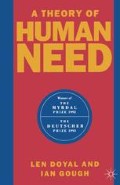Abstract
Just as the economic organisation of a society which accords a high priority to optimising need-satisfaction must consist of a duality, so too must its political organisation. If human needs have strict priority over other political goals, then all people have the right to optimal need-satisfaction based on the best available knowledge. Such a view might seem to support the authority of experts. However, we have seen that appropriate and effective understanding of needs can only be obtained through informed communication between all those with relevant experience — communication which is carefully structured to optimise the rationality of its outcome. Experts constitute just one group of participants in such a debate. Here, we shall argue that central planning and democratic participation are both necessary components of social policy formation if it is to succeed in optimising need-satisfaction. In short, what is required for the optimisation of need-satisfaction is a ‘dual strategy’ incorporating both the generality of the state and the particularity of civil society.
Preview
Unable to display preview. Download preview PDF.
Copyright information
© 1991 Len Doyal and Ian Gough
About this chapter
Cite this chapter
Doyal, L., Gough, I. (1991). A Dual Political Strategy. In: A Theory of Human Need. Palgrave, London. https://doi.org/10.1007/978-1-349-21500-3_15
Download citation
DOI: https://doi.org/10.1007/978-1-349-21500-3_15
Publisher Name: Palgrave, London
Print ISBN: 978-0-333-38325-4
Online ISBN: 978-1-349-21500-3
eBook Packages: Palgrave Political & Intern. Studies CollectionPolitical Science and International Studies (R0)

